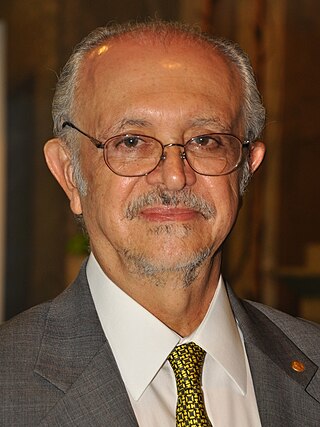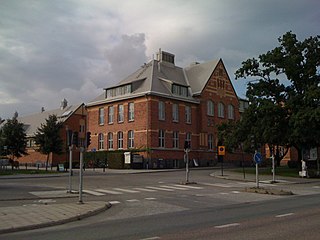Related Research Articles

The Nobel Prizes are five separate prizes that, according to Alfred Nobel's will of 1895, are awarded to "those who, during the preceding year, have conferred the greatest benefit to humankind." Alfred Nobel was a Swedish chemist, engineer, and industrialist most famously known for the invention of dynamite. He died in 1896. In his will, he bequeathed all of his "remaining realisable assets" to be used to establish five prizes which became known as "Nobel Prizes". Nobel Prizes were first awarded in 1901.
An economist is a professional and practitioner in the social science discipline of economics.

The Right Livelihood Award is an international award to "honour and support those offering practical and exemplary answers to the most urgent challenges facing us today." The prize was established in 1980 by German-Swedish philanthropist Jakob von Uexkull, and is presented annually in early December. An international jury, invited by the five regular Right Livelihood Award board members, decides the awards in such fields as environmental protection, human rights, sustainable development, health, education, and peace. The prize money is shared among the winners, usually numbering four, and is €200,000. Very often one of the four laureates receives an honorary award, which means that the other three share the prize money.

George Charles de Hevesy was a Hungarian radiochemist and Nobel Prize in Chemistry laureate, recognized in 1943 for his key role in the development of radioactive tracers to study chemical processes such as in the metabolism of animals. He also co-discovered the element hafnium.

Mario José Molina Henríquez was a Mexican physical chemist. He played a pivotal role in the discovery of the Antarctic ozone hole, and was a co-recipient of the 1995 Nobel Prize in Chemistry for his role in discovering the threat to the Earth's ozone layer from chlorofluorocarbon (CFC) gases. He was the first Mexican-born scientist to receive a Nobel Prize in Chemistry and the third Mexican-born person to receive a Nobel prize.

Paul Jozef Crutzen was a Dutch meteorologist and atmospheric chemist. He and Mario Molina and Frank Sherwood Rowland were awarded the Nobel Prize in Chemistry in 1995 for their work on atmospheric chemistry and specifically for his efforts in studying the formation and decomposition of atmospheric ozone. In addition to studying the ozone layer and climate change, he popularized the term Anthropocene to describe a proposed new epoch in the Quaternary period when human actions have a drastic effect on the Earth. He was also amongst the first few scientists to introduce the idea of a nuclear winter to describe the potential climatic effects stemming from large-scale atmospheric pollution including smoke from forest fires, industrial exhausts, and other sources like oil fires.
The "World Scientists' Warning to Humanity" was a document written in 1992 by Henry W. Kendall and signed by about 1,700 leading scientists. Twenty-five years later, in November 2017, 15,364 scientists signed "World Scientists' Warning to Humanity: A Second Notice" written by William J. Ripple and seven co-authors calling for, among other things, human population planning, and drastically diminishing per capita consumption of fossil fuels, meat, and other resources. The second notice has more scientist cosigners and formal supporters than any other journal article ever published.

Hans Joachim "John" Schellnhuber is a German atmospheric physicist, climatologist and founding director of the Potsdam Institute for Climate Impact Research (PIK) and former chair of the German Advisory Council on Global Change (WBGU).

The Nobel Memorial Prize in Economic Sciences, officially the Sveriges Riksbank Prize in Economic Sciences in Memory of Alfred Nobel, is an economics award funded by Sveriges Riksbank and administered by the Nobel Foundation.

Planetary boundaries are a framework to describe limits to the impacts of human activities on the Earth system. Beyond these limits, the environment may not be able to self-regulate anymore. This would mean the Earth system would leave the period of stability of the Holocene, in which human society developed. The framework is based on scientific evidence that human actions, especially those of industrialized societies since the Industrial Revolution, have become the main driver of global environmental change. According to the framework, "transgressing one or more planetary boundaries may be deleterious or even catastrophic due to the risk of crossing thresholds that will trigger non-linear, abrupt environmental change within continental-scale to planetary-scale systems."

The Nobel Prize in Chemistry is awarded annually by the Royal Swedish Academy of Sciences to scientists in the various fields of chemistry. It is one of the five Nobel Prizes established by the will of Alfred Nobel in 1895, awarded for outstanding contributions in chemistry, physics, literature, peace, and physiology or medicine. This award is administered by the Nobel Foundation, and awarded by the Royal Swedish Academy of Sciences on proposal of the Nobel Committee for Chemistry which consists of five members elected by the Academy. The award is presented in Stockholm at an annual ceremony on 10 December, the anniversary of Nobel's death.

Johan Rockström is a Swedish scientist, internationally recognized for his work on global sustainability issues. He is joint director of the Potsdam Institute for Climate Impact Research (PIK) in Germany, together with economist Ottmar Edenhofer. He is also Professor in Earth System Science at the University of Potsdam and Professor in Water Systems and Global Sustainability, Stockholm University.
Earth system governance is a recently developed paradigm that builds on earlier notions of environmental policy and nature conservation, but puts these into the broader context of human-induced transformations of the entire earth system.

The Stockholm Resilience Centre (SRC), is a research centre on resilience and sustainability science at Stockholm University. It is a joint initiative between Stockholm University and the Beijer Institute of Ecological Economics at the Royal Swedish Academy of Sciences.

Malin Fredrika Sofia Sundberg-Falkenmark, born 21 November 1925) is a Swedish hydrologist. Falkenmark is best known for her long-standing work and expertise on the sustainable use of water resources to meet human and ecosystem needs. Her work is characterized by an integration of both natural- and social-science approaches. She is particularly known for developing what is now known as the Falkenmark Water Stress Indicator, an indicator used to measure and describe the water available for human use. She is the daughter of Halvar Sundberg.

The VinFuture Prize is an annual international award that honors remarkable scientific breakthroughs and promotes innovations for mankind, with involvement from world-renowned scientists, policymakers, business leaders, and Prize holders. It is the first influential and worldwide prize to be founded in Vietnam, and it is hosted by the VinFuture Foundation.
References
- ↑ "The Stockholm memorandum: tipping the scales towards sustainability". Ambio. 40 (7): 781–5. 2011. doi:10.1007/s13280-011-0187-8. PMC 3357746 . PMID 22338715.
- ↑ "The Stockholm Memorandum Tipping the Scales towards Sustainability; 3rd Nobel Laureate Symposium on Global Sustainability" (PDF). nobel-cause.de. Nobel Cause Symposium. 18 May 2011. Retrieved September 12, 2016.
Peter Agre, Nadine Gordimer, Yuan T. Lee, Elinor Ostrom, Werner Arber, David Gross, James Mirrlees, Carlo Rubbia, Paul J. Crutzen, Mario J. Molina, Amartya Sen, Peter Doherty (scientist), Walter Kohn, Douglass North, John Sulston, Murray Gell-Mann, Harold Kroto, Douglas Osheroff, Muhammad Yunus
- ↑ 3rd Nobel Laureate Symposium on Sustainability, "Transforming the World in an Era of Global Change," 16–19 May 2011, http://globalsymposium2011.org/
- ↑ Stockholm Memorandum, "Tipping the Scales Toward Sustainability," 18 May 2011, pdf
- ↑ Stockholm Resilience Centre, Stockholm University, 31 May 2011, http://www.stockholmresilience.org/newsandvideos/generalnews/thestockholmmemorandum.5.4bb0052912fd16044aa800011821.html